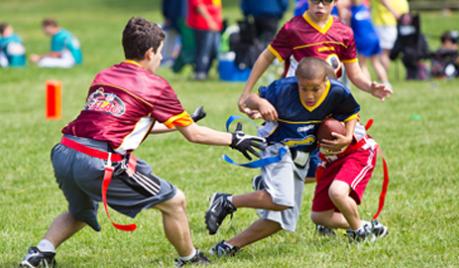Effective communication and teamwork are pivotal in the youth sports, especially in flag football where coordination and cooperation play critical roles in team success. This update explores key strategies for fostering these essential skills among young athletes, coaches, and parents involved in youth flag football.
Fundamentals of Effective Communication
- Types of Communication: In flag football, communication can be verbal (shouts and calls), non-verbal (hand signals, body language), and visual (using signs or visual aids). Each type plays a unique role in ensuring players understand play calls and team strategies.
- Communication Skills for Young Athletes: We strive to teach our young athletes on how to communicate clearly and effectively during games and practices. This includes expressing themselves clearly, using appropriate signals, and ensuring their teammates understand their intentions.
Building Team Cohesion
- Role of Team Bonding Activities: Regular team bonding activities can enhance trust and understanding among players, leading to better on-field performance.
- Encouraging Teamwork Through Drills and Practice: Designing drills that require players to work together to succeed can foster a sense of teamwork and collective effort.
The Role of the Coach
- Techniques for Coaches to Enhance Communication: We aim to model effective communication and provide clear, concise instructions during our practices and games.
- Creating a Positive Team Culture: A positive team culture is key to our success, thus we always encourage open communication and feedback, making players feel valued and part of the team’s success.
Strategies for Players
- Developing Leadership Among Players: Encouraging our players to take on leadership roles helps develop their ability to communicate under pressure and guide their peers.
- Importance of Listening and Feedback: Our players are be taught the importance of listening to instructions and feedback, as well as providing constructive feedback to their teammates.
Game Day Communication
- Pre-Game Preparation: Effective communication begins before the game, with all position coaches discussing strategies and players ensuring they understand their roles.
- In-Game Communication Strategies: During the game, players need to communicate constantly to adapt to dynamic play situations and make quick decisions.
Dealing with Communication Barriers
- Common Challenges and Solutions: Identifying common communication barriers, such as noisy environments or misunderstandings, and implementing strategies to overcome them is essential.
- Importance of Consistency in Messages: Consistent messages from coaches and team leaders help reinforce learning and ensure all team members are on the same page.
Role of Parents in Team Communication
- Supporting Team Goals and Spirit: Parents play a significant role in supporting the team by reinforcing the importance of teamwork and positive communication.
- Ensuring Positive Communication from the Sidelines: Parents should be encouraged to communicate positively from the sidelines to foster a supportive environment for all players.
Technology and Tools for Improving Communication
- Using Apps and Software for Team Management: We use Various apps and tools to help manage team schedules, share playbooks, and facilitate communication among team members and coaches. You will find them in the Resources section on our website by clicking here and navigating to the DEVICE APPS tab.
- Effective Use of Social Media and Communication Platforms: Social media and other communication platforms can be used to keep the team connected, share updates, and celebrate successes.
Drills to Improve Teamwork and Communication
- Specific Drills for Enhancing On-field Communication: You will see us often running drills that simulate game scenarios and require our players to communicate to complete objectives can be particularly effective.
- Team-Building Activities that Promote Unity: Activities outside of regular practices that focus on team-building can help strengthen bonds and improve communication are also critical and we suggest all parents pushing their emerging stars in open, and direct communication with others.
Common Mistakes in Team Communication
- Identifying and Avoiding Pitfalls: Common communication mistakes in youth flag football include overcomplicating messages, lack of feedback, and inconsistent communication. A real goal of all our coaching educators on the field is to provide constructive and direct feedback.
- Corrective Actions and Best Practices: Offering solutions and best practices can help teams improve their communication strategies and avoid common pitfalls.
The Psychological Aspect of Team Sports
- Impact of Good Communication on Player Psychology: Effective communication can boost confidence and reduce anxiety, leading to better performance and more enjoyable experiences.
- Building Confidence Through Supportive Team Dynamics: Fostering an environment where players feel supported and confident can lead to greater success and satisfaction in team sports.
Wrapping Up
The success of youth flag football teams heavily relies on effective communication and robust teamwork. By implementing the strategies discussed, teams can enhance their performance, build stronger relationships, and create a more enjoyable and rewarding experience for everyone involved. Encouraging ongoing development and learning in communication can set young athletes up for success both on and off the field.





This site is protected by reCAPTCHA and the Google Privacy Policy and Terms of Service apply.